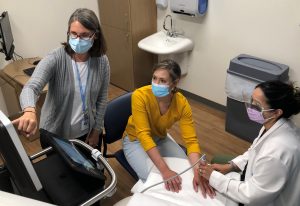
Arthritis Awareness Month – Osteoarthritis Studies
May is Arthritis Awareness Month. Osteoarthritis (OA) is the most common form of arthritis, and researchers at the UNC Thurston Arthritis Research Center are nationally and internationally recognized for their work in basic, translational, and clinical OA research. The UNC Core Center for Clinical Research, or CCCR, provides a variety of resources to researchers in OA and other rheumatic and musculoskeletal diseases, including a speaker series and collaborative sessions.
Johnston County Osteoarthritis Project
UNC is the home of two large community-based cohorts focused on the study of OA: the ongoing longitudinal Johnston County Osteoarthritis Project, which continues to provide invaluable and unique information on risk factors, prevalence, and progression of OA at multiple joint sites, and marks its 30thyear in 2021.
Johnston County Health Study
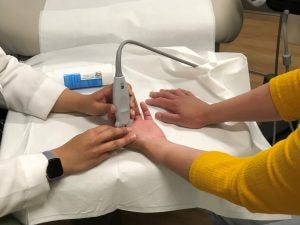 The Johnston County Health Study (JoCoHS) is currently enrolling a cohort which includes younger (35 and up) and Hispanic individuals, in addition to Black and White men and women. It will soon enroll its 300thparticipant. Drs. Amanda Nelson and Yvonne Golightly, co-PIs of these studies, continue to invite collaborations using these rich data sources. Ultrasound (US) is a promising imaging modality that Dr. Nelson is studying in the JoCoHS for OA and using more broadly in our Rheumatology clinic.
The Johnston County Health Study (JoCoHS) is currently enrolling a cohort which includes younger (35 and up) and Hispanic individuals, in addition to Black and White men and women. It will soon enroll its 300thparticipant. Drs. Amanda Nelson and Yvonne Golightly, co-PIs of these studies, continue to invite collaborations using these rich data sources. Ultrasound (US) is a promising imaging modality that Dr. Nelson is studying in the JoCoHS for OA and using more broadly in our Rheumatology clinic.
We recently added another RhMSUS certified faculty member, Dr. Orzechowski, and have expanded our Rheumatology US clinic, which is an important learning venue for our fellows, in addition to dedicated didactic and hands-on US education. Drs. Nelson and Orzechowski also participate in the UNC Internal Medicine residents’ Point of Care US (POCUS) elective.
OA Action Alliance
UNC is the home of the OA Action Alliance(OAAA), a coalition of organizations committed to elevating osteoarthritis (OA) as a national health priority and promoting effective policy [systems and environmental] solutions that address the individual and national toll of OA. The OAAA just launched a NEW resource section on its website for people with joint pain, offering videos, educational resources, and content to share on key topics in OA.
Allergy Awareness Month – Updates on Alpha-Gal Syndrome
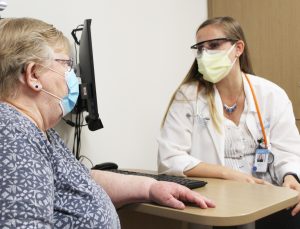
May is also Allergy Awareness Month. A major area of innovative allergy research is related to the tick-acquired mammalian meat allergy, often referred to as ‘alpha-gal syndrome (AGS).’ Since the initial description of the syndrome nearly a decade ago, the research performed by Dr. Scott Commins and his colleagues has continued to play an important role in increasing our understanding of the pathophysiology and manifestations of the syndrome. Current interests relate to understanding the connection to tick bites and formally assessing this environmental factor through a CDC-funded case-control study. From a mechanistic perspective, we are working to conduct experiments using the recently published alpha-gal deficient murine model for AGS.
Two emerging areas of interest include accumulating evidence that IgE sensitization to alpha-gal could have implications for disorders that are not traditionally considered to be ‘allergic diseases’:
1) the hypothesis that alpha-gal could be relevant to heart disease, and
2) the possibility that alpha-gal could be an important cause of IBS-like symptoms among subjects who live in areas where the lone star tick is endemic.
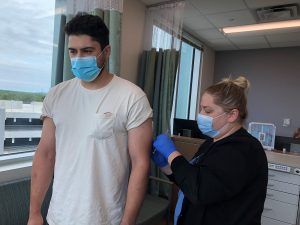
Finally, we are excited about emerging collaborative initiatives across several campuses owing to our inclusion in the “Creativity Hub” award from the Office of the Vice Chancellor for Research…to foster fluid, cross-disciplinary research, to establish campus networks that nurture research innovation and risk-taking, and to promote a pervasive culture that drives discovery and curiosity. The Vector-Borne Disease: Epidemiology, Ecology & Response (VEER) Hub is comprised of academic investigators and public health practitioners from the University of North Carolina at Chapel Hill and collaborators from partner universities, military installations and health care agencies who are committed to the protection of people, animals, and livelihoods from vector-borne diseases (VBD) — an epidemic affecting the entire state, but particularly those living in rural and underserved communities in North Carolina.
Lupus Awareness – All Things Lupus
May is Lupus Awareness Month, the time to “put on purple” for lupus awareness.
History
 The word lupus is Latin for wolf. In the 18th century, when lupus was starting to be recognized as a disease, it was thought to be caused by the bite of a wolf. This may have been because of the distinctive facial rash characteristic of lupus that can often leave a bite-like imprint. Lupus is not a new disease. It is believed to have been described by Hippocrates around 400 BC.
The word lupus is Latin for wolf. In the 18th century, when lupus was starting to be recognized as a disease, it was thought to be caused by the bite of a wolf. This may have been because of the distinctive facial rash characteristic of lupus that can often leave a bite-like imprint. Lupus is not a new disease. It is believed to have been described by Hippocrates around 400 BC.
Systemic lupus erythematosus (SLE/Lupus) is a chronic, inflammatory autoimmune disease that primarily affects women of childbearing age, and disproportionately affects individuals of Black/African ancestry and of Hispanic/Latino ethnicity, who experience greater morbidity and mortality from the disease. Between 2000-2015, SLE was the fifth leading cause of death among Black and Hispanic females ages 15-24 years and was among the top 20 leading causes of death in the US among females ages 5-64 years. Lupus can affect any part of the body from head to toe, including the skin, joints, organs inside the body such as the kidneys, the heart, the liver, the lungs, the brain, and many others. As in other autoimmune diseases, in lupus, the immune system starts to attack itself. It produces proteins called autoantibodies that attack and destroy healthy tissues of the body. This results in pain, inflammation, and damage to those tissues.
Lupus, Sjogren’s & Autoimmunity Research
A comprehensive Lupus, Sjogren’s & Autoimmunity Research program, with a focus on clinical and translational research, is led by Dr. Saira Sheikh at the UNC Thurston Arthritis Research Center (TARC). This is a multi-disciplinary platform that emphasizes Team Science and brings together physicians, researchers, and patients to answer scientific questions that advance health and healing for those with autoimmune diseases.
The team is interested in the development of diagnostic assays and potential biomarkers for autoimmune diseases and has partnered with a local biotech company and have successfully received two NIH Small Business Research (SBIR) Phase I grants and one Phase II grant to commercialize development of novel cell-based assays to diagnose and track autoimmune diseases.

Project PURPLE
“Programs to address Unmet needs and promote Representation of all Participants in Lupus clinical trials using mobile technology for Engagement” (Project PURPLE) is a pilot study evaluating a first of its kind, personalized and customizable digital patient engagement/educational tool developed by Dr. Sheikh’s team in partnership with RTI International and Pattern Health. This program addresses known barriers to clinical trial enrollment using custom interactive avatars modeled after Dr. Saira Sheikh and Dr. Alfredo Rivadeneira, who delivers the program in Spanish, with voiceovers for their avatars provided by both physicians themselves.
Click on their names to watch the avatar videos: Dr. Saira Sheikh and Dr. Alfredo Rivadeneira.
MONA Lupus
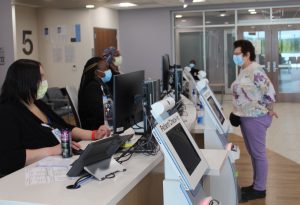
Through partnership with our collaborators in gastroenterology (Dr. Shehzad Sheikh and team) and nephrology (Dr. Vimal Derebail, Dr. Keisha Gibson, Dr. Manish Saha, Dr. Susan Hogan and Caroline Poulton), we are leading the Multi-Omic iNtegrated Analysis in Lupus (MONA Lupus) project.
Our collaborative research group at UNC, Chapel Hill Alliance Promoting Excellence in Lupus (CHAPEL), with colleagues in nephrology, meets monthly, and our work has been presented at national rheumatology and nephrology meetings over the past years.
We have a robust clinical trials program, through which we are studying innovative therapies that target specific molecular pathways in lupus. Dr. Sheikh has led the largest clinical trial in SLE to date, the multinational Belimumab Assessment of Safety in SLE (BASE) study. She is also the incoming Vice-Chair of the Lupus Clinical Trials Investigator Network (LuCIN), which is the largest lupus clinical trials network of academic institutions in the US and Canada.
Dr. Sheikh’s team is collaborating on novel clinical trials in other disciplines (dermatology, nephrology, gastroenterology, neuroscience, and psychiatry).
Lupus Brain
Utilizing the expertise of neuroscientist, Dr. Flavio Frohlich, we have designed “Lupus Brain,” the first clinical trial to evaluate the efficacy of transcranial alternating current stimulation (tACS) to target symptoms of “brain fog”, depression, cognitive decline, and pain in patients with SLE. Targeted stimulation modalities, such as tACS, show great promise in enhancing neural connectivity in distinctive brain regions, resulting in reduced chronic pain, cognitive impairment, and mood symptoms, and we are studying them for the first time in patients with lupus.
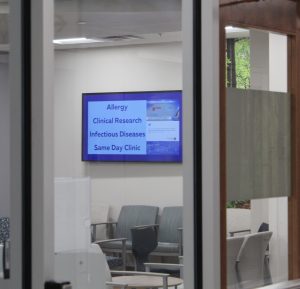 ACT for Lupus Study
ACT for Lupus Study
We have partnered with psychologist Dr. Crystal Schiller to develop the ACT for Lupus Study, which is a pilot evaluation of a novel Acceptance and Commitment Therapy (ACT) based virtual skills training program to improve coping skills and psychosocial outcomes among patients with lupus during the COVID 19 pandemic. This study was promoted nationally by the Lupus Foundation of America.
PainCOACH Study
With Dr. Kelli Allen’s team at TARC, we conducted the PainCOACH study of an Internet-Based Pain Coping Skills Training Program, pain TRAINER, for patients with SLE and found that participants who used the program reported meaningful improvements in multiple patient reported outcomes, including fatigue and health-related quality of life- supporting the promise of online, self-directed programs for patients with SLE.
Walk SLE Study
With the expertise and experience of Dr. Rebecca Cleveland and Dr. Leigh Callahan, we completed the Walk SLE study, to assess feasibility, tolerability, safety, acceptability, and effectiveness of the self-directed format of the Arthritis Foundation’s Walk with Ease program in patients with lupus, and found it to be safe, acceptable, and beneficial to reduce stiffness and fatigue in these individuals.
Dr. Saira Sheikh is also working on a national level to help address racial disparities in lupus clinical trials and to promote inclusion and diversity in lupus clinical trials. She has received recognition on a national level around these efforts.
Materials to Improve Minority Involvement in Clinical Trials (MIMICT) Study
In partnership with the American College of Rheumatology (ACR) and funding through the U.S. Department of Health and Human Services Office of Minority Health, we developed the ‘Materials to Improve Minority Involvement in Clinical Trials (MIMICT) study’, exploring models to help physicians overcome barriers and focus on improving education and referral of minority patients to lupus clinical trials.
Patient Advocates for Lupus Studies (PALS) Program
Dr. Sheikh is co-leading the Patient Advocates for Lupus Studies (PALS) program funded through Lupus Therapeutics and the Lupus Research Alliance, in which she serves in a national leadership role for the implementation and subsequent growth of the program. This is an innovative pilot study being conducted at five academic centers nationwide, in which education about lupus clinical trials is delivered to patients directly through trained patient advocates (PALs) who have personal experience with clinical trials.